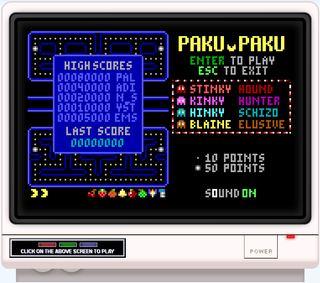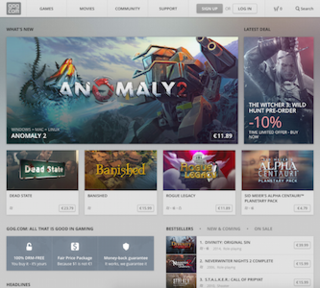Related Research Articles

Duke Nukem 3D is a first-person shooter video game developed by 3D Realms. It is a sequel to the platform games Duke Nukem and Duke Nukem II, published by 3D Realms.
Bethesda Softworks LLC is an American video game publisher based in Rockville, Maryland. The company was founded by Christopher Weaver in 1986 as a division of Media Technology Limited. In 1999, it became a subsidiary of ZeniMax Media. In its first 15 years, it was a video game developer and self-published its titles. In 2001, Bethesda spun off its in-house development team into Bethesda Game Studios, leaving Bethesda Softworks to focus on publishing operations.

Duke Nukem Forever is a 2011 first-person shooter game developed by Gearbox Software and published by 2K for Windows, PlayStation 3, and Xbox 360. It is the fourth main installment in the Duke Nukem series and the sequel to Duke Nukem 3D (1996). Players control Duke Nukem as he comes out of retirement to battle an alien invasion. Like its predecessor, Duke Nukem Forever features pop culture references, toilet humor, and adult content.

3D Realms Entertainment ApS is a video game publisher based in Aalborg, Denmark. Scott Miller founded the company in his parents' home in Garland, Texas, in 1987 as Apogee Software Productions to release his game Kingdom of Kroz. In the late 1980s and early 1990s, the company popularized a distribution model where each game consists of three episodes, with the first given away free as shareware and the other two available for purchase. Duke Nukem was a major franchise created by Apogee to use this model, and Apogee published Commander Keen and Wolfenstein 3D the same way.

Shadow Warrior is a first-person shooter video game developed by 3D Realms and published by GT Interactive. The shareware version was released for the PC on May 13, 1997, while the full version was completed on August 25, 1997 and released in stores on September 16, 1997. Shadow Warrior was developed using Ken Silverman's Build engine and improved on 3D Realms' previous Build engine game, Duke Nukem 3D. Mark Adams ported Shadow Warrior to Mac OS in August 1997.
A software license is a legal instrument governing the use or redistribution of software. Under United States copyright law, all software is copyright protected, in both source code and object code forms, unless that software was developed by the United States Government, in which case it cannot be copyrighted. Authors of copyrighted software can donate their software to the public domain, in which case it is also not covered by copyright and, as a result, cannot be licensed.

Steam is a video game digital distribution service and storefront developed by Valve Corporation. It was launched as a software client in September 2003 to provide game updates automatically for Valve's games, and expanded to distributing third-party titles in late 2005. Steam offers various features, like game server matchmaking with Valve Anti-Cheat measures, social networking, and game streaming services. Steam client's functions include game update automation, cloud storage for game progress, and community features such as direct messaging, in-game overlay functions and a virtual collectable marketplace.

A personal computer game, also known as a computer game or abbreviated PC game, is an electronic game played on a personal computer (PC) and form of video game. They are defined by the open platform nature of PC systems.
GarageGames was a game technology and software developer. GarageGames was the parent company of GG Interactive, developers of educational technology in the areas of computer science, video game development and programming. In addition, the company has been a video game developer and publisher. GarageGames created several game engines targeted for indie development. Founded in Eugene, Oregon, the company had offices in Las Vegas, Nevada, United States and its headquarters in Vancouver, Washington. In 2007, GarageGames was acquired by IAC and the company was renamed TorquePowered. In 2011, the company was purchased by Graham Software Development and reverted to the original name GarageGames.

Prey is a first-person shooter video game developed by Human Head Studios, under contract for 3D Realms, and published by 2K Games, while the Xbox 360 version was ported by Venom Games. The game was initially released in North America and Europe on July 11, 2006. Prey uses a heavily modified version of id Tech 4 to use portals and variable gravity to create the environments the player explores.
Digital distribution, also referred to as content delivery, online distribution, or electronic software distribution, among others, is the delivery or distribution of digital media content such as audio, video, e-books, video games, and other software.
EA is a digital distribution platform for Microsoft Windows and macOS, developed by Electronic Arts for purchasing and playing video games.
Downloadable content (DLC) is additional content created for an already released video game, distributed through the Internet by the game's publisher. It can either be added for no extra cost or it can be a form of video game monetization, enabling the publisher to gain additional revenue from a title after it has been purchased, often using some type of microtransaction system.
Digital rights management (DRM) is the management of legal access to digital content. Various tools or technological protection measures (TPM) like access control technologies, can restrict the use of proprietary hardware and copyrighted works. DRM technologies govern the use, modification and distribution of copyrighted works and of systems that enforce these policies within devices. DRM technologies include licensing agreements and encryption.
GamersGate AB is a Sweden-based online video game store offering electronic strategy guides and games for Windows, macOS, and Linux via direct download. It is a competitor to online video game services such as Steam, GOG.com, and Direct2Drive.

GOG.com is a digital distribution platform for video games and films. It is operated by GOG sp. z o.o., a wholly owned subsidiary of CD Projekt based in Warsaw, Poland. GOG.com delivers DRM-free video games through its digital platform for Microsoft Windows, macOS and Linux.
In the video game industry, digital distribution is the process of delivering video game content as digital information, without the exchange or purchase of new physical media such as ROM cartridges, magnetic storage, optical discs and flash memory cards. This process has existed since the early 1980s, but it was only with network advancements in bandwidth capabilities in the early 2000s that digital distribution became more prominent as a method of selling games. Currently, the process is dominated by online distribution over broadband Internet.
An online pass is a digital rights management system for restricting access to supplemental functionality in a product by using a single-use serial number. Online passes are primarily intended to hinder or discourage the second-hand purchase of a product, and to allow the producer of a product to still return profits from second-hand copies of the product.
Video game monetization is a type of process that a video game publisher can use to generate revenue from a video game product. The methods of monetization may vary between games, especially when they come from different genres or platforms, but they all serve the same purpose to return money to the game developers, copyright owners, and other stakeholders. As the monetization methods continue to diversify, they also affect the game design in a way that sometimes leads to criticism.